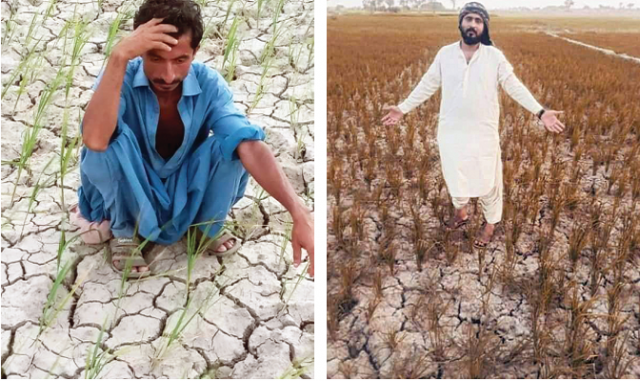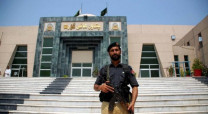Water scarcity: growers abandon paddy crop
Influential persons rob small farmers of irrigation water by diverting tributaries

For two months Sobdar Khoso has waited for the Warrah Branch in Qambar Shahdadkot to have enough water for him to sow his paddy crops in the Kharif season.
After pinning his hopes on rain, which did not fall, Khoso, like hundreds of other growers, has now given up on growing Kharif crops this season. "This year's expense on the land, paddy seed, my labour will [all] go in vain as I will not be able to grow the crop," he lamented, speaking to The Express Tribune.
Khoso's 10 acres of land is near the Aocho Minor water tributary that is fed by the Warrah Branch, where the water level has dropped to its lowest point. "Influential landlords and local politicians have set up motorfans to suck the water that is available, depriving all of us of it."
Since his pocket cannot afford to hire a motor or pay for the fuel to run it, Khoro has decided to abandon hope of sowing his paddy crops this Kharif season
A rich man's world
A visit to the site reveals that nearly all of the small and medium water canals and branches have been infiltrated by diesel generators. Thousands of acres of land has consequently been rendered barren.
The growers who cannot afford these additional costs have begun protesting against the shortage and manipulation of irrigation water. Staging sit-ins on regulators of the Warrah Branch, they have decried the disruption of irrigation water but their grievances have fallen on deaf ears.
"When this season began and first waterflow reached [the tributary], two tribal chieftains, who are also elected representatives [in assembly], attached all energy [sources] to divert the irrigation water towards their land first," said Ali Jan Channa, a small landlord in the area. Since then, everyone has been trying to prioritise their own needs, added Channa, who joins the demonstrators in front of Kambar and Warrah press clubs every Sunday.
The protesters contend that if the waterflow from the Warrah Branch, which runs from the Kirthar Canal of Sukkur Barrage, is not blocked by influential upstream landlords, they would have normal water supply.
Conceding that there was an overall shortage of water, Khadim Junejo, a local landlord, pointed out that the farmers' of the area were doubly deprived. "We are facing the worst condition. In our neighbourhood, the growers near the Rice Canal, which also derives its water from the Sukkur Barrage, are about to harvest their crops. But we are still struggling to sow it."
Why is the water crisis this severe for farmers here, asked Junejo. "I have not witnessed such a situation since my childhood. Every year we [would] get abundant flow this season."
Thousands of acres of agricultural land in the Kambar and Warrah tehsils relies on irrigation water from the Warrah Branch. Tail-end growers of the Ghari regulators, including the Puna Branch and Naseer Shakh, have also launched a protest movement, with hundreds of growers staging sit-ins.
Hefty costs, little gain
Junejo, who owns seven acres of land sown with paddy crops after hiring a motorfan to get water from the bottom of the canal, said he paid Rs1,200 per hour for sufficient diesel to keep the machine running round the clock. This has significantly increased his costs.
"Given the water crises, some people have purchased generators priced between Rs40,000 to Rs150,000," said Manzoor Chandio, a local grower. This may leave Kharif farmers without profits this year and many will bear losses, believes Chandio.
He lamented that the low flow of water, which came in the bottom of the branch, has also been stopped. "People are worried about recently sown paddy crops, which have become yellow and dry.
Pointing fingers
When contacted, local officials attributed the water scarcity for farmers dependent on the Warrah Branch to the overall water shortage in the river system. Meanwhile, Sindh Irrigation Minister Jam Khan Shoro held the Indus River System Authority responsible for the water scarcity.
"We have protested against IRSA's decisions and written letters. We will raise this issue at the proper forum as well," he said, accusing IRSA of supplying only 50 per cent of Sindh's seasonal water requirement. "
As per the Water Apportionment Accord 1991, the lower riparian province is supposed to receive 48 million acre-feet (MAF) water per annum. But currently only half of that allocation is being provided to the province," he told the media earlier.
"According to the Accord, 10 MAF water has to be released downstream of Kotri Barrage [in Jamshoro district] towards the sea. But, even that provision of the accord is being violated."



















COMMENTS
Comments are moderated and generally will be posted if they are on-topic and not abusive.
For more information, please see our Comments FAQ